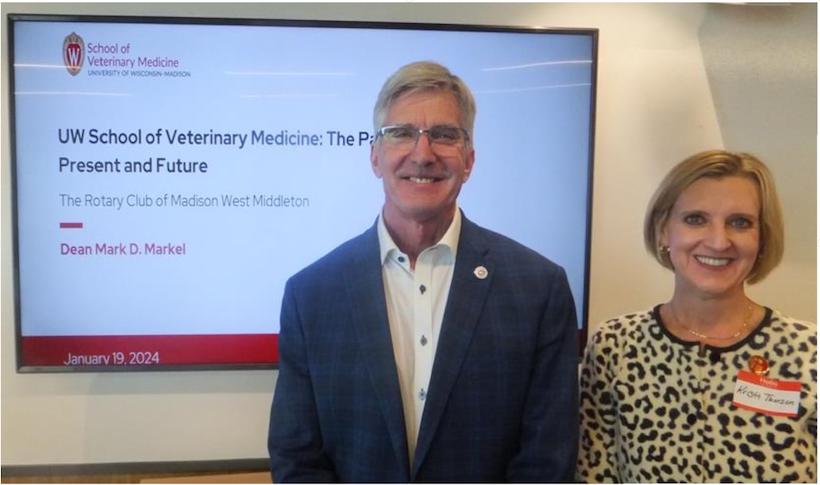The Dean from the UW School of Veterinary Medicine, Dean Mark Markel, was the guest speaker at the Madison West Middleton Rotary Club recently. He was very happy to tell us about the new hospital and research facility being built north of the current school’s current site. Construction of the North Building started in July 2021 at a cost of $180,000,000. The North Building will open in spring 2024. The existing veterinary school referred to as the South Building is being remodeled and completion on that will be early 2025.

Dean Mark Markel and Assistant Dean Kristi Thorson
The North Building is a three-story structure and will provide ample space for the School of Veterinary Medicine to introduce twelve innovative technologies in the new Clinical Skills Training Center. This will allow students and clinicians to get more hands-on training in core clinical skills. Among the new equipment added this year are improved life-sized cow and horse models, an endoscope training tool and a 3D molding device. Newly invented CT scanning equipment is being used to do scans of horses or cows while they are standing. This is a big-time saver and much easier on the animal. Dean Merkel helped to invent this CT scanner, which has been purchased by veterinary medical facilities from all around the world. Dean Merkel has done extensive research in joints, ligaments and bone regeneration for both equine and bovine.
The UW Veterinary Care provided care to around 29,000 patients during 2022-23. These patients included 20,301 canine, 4,686 feline, 881 equine, 715 avian, 744 lapine, and 259 bovine. (Note: this was taken from the 2023 Annual Report.) The UW School of Veterinary Medicine is a major research center on campus, doing the majority of infectious disease at the UW. Their findings have provided remarkable medical improvements for both people as well as animals. Last year the school generated $38.4 million in research and extramural awards (Federal and Non- Federal). The new facility “the North Building” will set the standard for World Class Veterinary research and hospital recovery.
This expansion will help the Veterinary Medical School to carry on the important work of advancing animal and human health. Some past research has yielded critical discoveries in the areas of influenza, oncology, and demyelinating disease. Dean Markel said the ability of SARS-CoV2 to mutate and spread among domestic, wild, and captive animals then jump from these animals to infect and cause severe disease in humans is a major public health concern. He reported that the rapid development of vaccines and anti-viral medications have proven to be effective in preventing COVID-19.
This expansion will help the Veterinary Medical School to carry on the important work of advancing animal and human health. Some past research has yielded critical discoveries in the areas of influenza, oncology, and demyelinating disease. Dean Markel said the ability of SARS-CoV2 to mutate and spread among domestic, wild, and captive animals then jump from these animals to infect and cause severe disease in humans is a major public health concern. He reported that the rapid development of vaccines and anti-viral medications have proven to be effective in preventing COVID-19.
In 2013 UW School of Veterinary Medicine started a new program to provide subsidized veterinary care to homeless pet owners in Madison. WisCARES (Wisconsin Companion Animal Resources, Education, and Social Services) provides subsidized veterinary medical care, housing support and advocacy, and other social services to Dane County pet owners who are low-income, homeless, or housing unstable.
Dean Markel is extremely proud of the students graduating from UW School of Veterinary Medicine.
The School of Veterinary Medicine may be open for group tours during UW’s 175th year celebration. More information can be found at www.vetmed.wisc.edu.